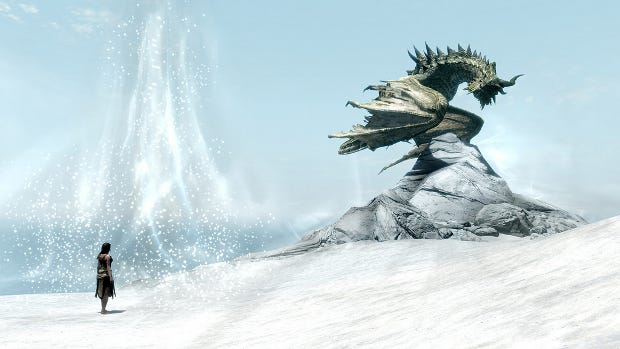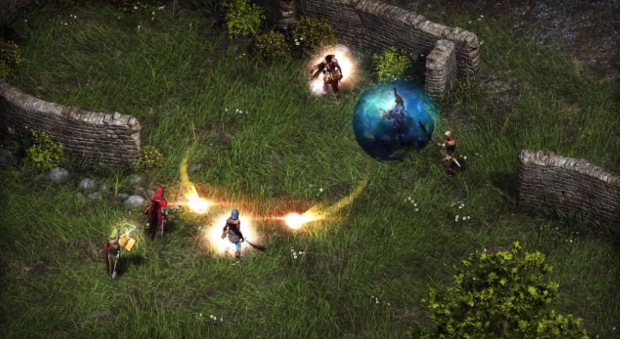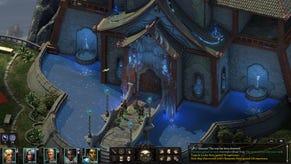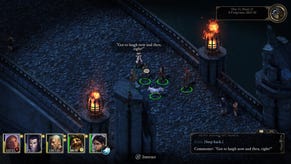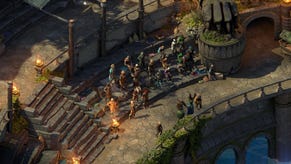Obsidian & Paradox On Eternity Team-Up, South Park Bugs
"We’re going to have a good amount of time to play and play and polish and polish"
Sound the unexpected announcement alarms and check to make sure over-jerked knees are covered by your insurance plan. Paradox has announced that it's publishing Obsidian's notoriously independent old-school RPG Pillars of Eternity, a big, (not, by most definitions) bad publishing type dipping its pinky toe into the brave new world of Kickstarter. "...Er, why?" You might ask. "Also didn't Obsidian get oodles of cash from backers? What happens to the game they paid for if Paradox decides all bets are off?" Well, good news is, Paradox can't actually do that. I quizzed Paradox CEO Fred Wester and Obsidian CEO Feargus Urquhart about their new partnership, creative control, what this means for backers, why the two companies struck a deal in the first place, whether Paradox is interested in pursuing other classic RPG revivals like Torment, and how South Park ended up glitchy despite Obsidian's allegedly renewed QA efforts. It's all below.
RPS: Up on stage you were talking about the benefits for Obsidian, that you get to focus all your time and resources into development. What does Paradox get, exactly, out of the deal?
Wester: First of all, it’s a big prestige thing for Paradox to do this partnership with Obsidian in the first place. We’re big fans. It takes us to the next level as a publisher. We show that we can not only provide smaller projects from smaller developers, but help companies like Obsidian as well, to hopefully succeed in this niche of the market they’ve cut out.
Urquhart: Bluntly, if the game does well, they do well. Just to call it and say, yes, obviously there’s a financial relationship, but it’s great for the game. They’ve done a great job of saying, hey, we’re going to support it this way, whether it sells one unit or a billion. That’s a great… Putting what you’re saying on the table.
Wester: We have an initial commitment to the game that makes us tied to the game to begin with. We have a lot to game from this game being good, because otherwise we lose a lot of money on this proposition.
Urquhart: That’s ultimately it. I think it’s the… It’s interesting, because when I think about where the industry is going and where it’s changing, it’s interesting to see how many more… I don’t want to call you guys a boutique publisher, because that’s the wrong thing. You’re not. There’s boutique publishers. I think of them as very one-off, where there’s six people in an office somewhere and everything else is outsourced. That’s not what Paradox is by any stretch of the imagination.
But I think a lot of it is, it’s interesting to see how you can use these other publishing groups to hook up with funded games like this, to support each other. I have friends at big publishers, and they feel a lot of the time like… They make a great game for their publisher. It moves the needle for the publisher that much. For us, if we do something and it kicks ass, it matters to both of us.
RPS: But it’s an interesting situation to be in. The notion of publishing a Kickstartered project is new. One of the things that you don’t necessarily know is, you had all this interest in the Kickstarter, but is that the full amount of interest for the game? Did everyone who might have thought about buying the game contribute their bit?
Wester: No, not really. For everyone who will pay up front for the game, there are 10 who will buy the finished game. That’s always the math. I wouldn’t call this a traditional publisher-developer relationship either, because that’s very important to emphasize. This is more of a partnership between two strong and independent companies. When we truly publish a game, we go in and fund it from day one and we have a lot of things that… This is a project from Obsidian, by Obsidian, with help from Paradox to bring it to market and reach the maximum audience. It’s different.
Urquhart: I hate the use the way to associate… It’s almost a mindkill for me to say this, but I don’t want to associate the idea of Kickstarter with preorders… It’s not the same thing. However, it is kind of the same. There’s a certain similarity in some ways. There are only so many people who go out and preorder a game versus the people who end up paying for the game, ultimately end up buying the game. It’s just different. So these are the people that… I would love to say that I could say ice to the Eskimos, but I can’t. People need to see proof of something and its success before they buy it. And maybe it’s just our gut. We’ve been doing this a while. Our gut and our hope is that this will work. We could have a conversation in however long and say, whoops, we were wrong! And we’d still be drinking beer and crying.
Wester: On the other hand, it wouldn’t be the first time we were wrong either, so it’s not a big deal that way. I would be kind of devastated if this project tanked, though. When you look at it, it fulfills all the boxes for me as an old-school RPG player. If the game is crap, of course it’s going to fail. But if the game is good and we still don’t reach that audience we want to reach? I would be disappointed. I think this game deserves to be played by a lot of people.
RPS: During your press conference you went into this, but just to absolutely clarify, this has functionally no effect on backers, right?
Urquhart: It has no effect from the standpoint of, yeah, every dollar they put in goes to the game. The person they’re going to communicate with about the game is us. They’ll continue to get updates from us. They can still yell at Josh on the forums and he will communicate as much or as little as Josh normally communicates. It has no effect on [stuff like that].
We’re still deciding everything. It’s not to say that Fred just gets to stand there. These guys play games and they’re going to have thoughts. But ultimately it’s our game. To be blunt, it’s what Fred said as well. Who’s going to be sending out all these physical goods? That comes from them. There will be a change. It won’t change what they’re going to get, but it won’t say From Obsidian.
Wester: Which gives Obsidian more time to work on the game, hopefully. You don’t have to spend a lot of time making sure that those promises are fulfilled.
RPS: You said that Paradox will play and have thoughts. How much, if at all, will you value that feedback over, say, that of a backer? You've been saying that Obsidian gets to keep full creative control, but how will this aspect really work?
Urquhart: They’re also backers.
Wester: We have 10 backers in the office. They are very opinionated. I’ll tell you that.
Urquhart: And I’ll listen to them more than I’ll listen to Paradox as a whole [laughs]. No. I mean, it sounds like a silly way to say it, but their influence as backers on what the game is going to be is probably actually more than Paradox, other than… They publish and develop a lot of PC games. They understand that market. I would be silly not to read it and [consider it].
Wester: We’re opinionated people at Paradox. We have a lot of opinions about everything. In this case, it’s up to Obsidian to listen or not to listen.
RPS: There is another way to look at it, though, in that I could see marketing affecting a game tangentially. "We need to show this by this point, so you need to have the game ready in this state so we can have a trailer made up." Little things like that. Are there any ways that could seep into and affect the development?
Wester: We don’t really work that way. We decided early that we don’t develop games from a marketing perspective. If we have to do something marketing-wise, we use what we already have. We create trailers and marketing materials that fit with what we already have. It’s very inconvenient to start doing things like extra demos just for E3 and stuff like that. We’ve never done that. We only go for what is best for the game. Then we adjust the marketing scheme from there.
Urquhart: The other thing is, this is a different world from doing something like Stick of Truth. Stick of Truth is going to ship out to everywhere, physically. When that’s the case, again it goes back to this: Stick of Truth has to go sell X millions of units just to make money. There has to be this machine behind it. That machine has to know this nine months before, that six months before. This is different. 90 percent of the people, our backers, are digital-only. And so a lot of it is just that, with that world, we don’t need marketing dates that are nine months in advance.
RPS: How are you going to market Eternity? When you look at this and think about its unique position as the type of game that hasn’t been around for a while, what do you do with that?
Wester: We adjust, obviously, the marketing budget, or the whole marketing plan, around what the game has to offer. We haven’t decided on the touch we’re going to give Pillars of Eternity. Of course we’re going to talk to Obsidian first about that. We just yesterday won a prize for best gameplay trailer at the marketing awards here, for Leviathan Warships. That had a $500 budget, and it got a million hits. It started out that it wasn’t going to be a trailer in the first place. It started out as a series of puns in the office, with “ship.” We were like, we had to use that timeline.
RPS: So does Jazz Boatman [see trailer above] actually work in your office?
Wester: Jazz Boatman, he works in the office. He’s actually our trailer guy. He made everything in that trailer himself. He made all the clips, all the voice-over, everything. Not the music. He licensed that from some stock music site. I don’t know. Pillars of Eternity might be some crazy shit, Leviathan Warships style, but also some more serious stuff, because the game deserves a more serious touch to it. You never know. We want people to expect the unexpected when we do our marketing. We’ll see. But I know that there are a lot of sick minds at both companies. I’m not worried about the marketing ideas behind this title.
RPS: Can you guys just riff out some puns on Eternity right now?
Wester: You start with fantasy, and it’s just already full of puns itself. It’s almost like the irony circle is complete already. You can’t even make it up anymore.
RPS: Did you ever consider other publishers for Pillars of Eternity?
Wester: Except for EA.
Urquhart: We talked to a number of other publishers. The challenge, for the bigger publishers, and honestly for us, we’d just become this little thing off in the corner. And you know what? Why do that to somebody? At that point we’d just do it ourselves. Because to be honest, that’s how even some of our bigger titles have been treated by publishers. We’re just little - 90 million dollars didn’t go into this game, so you get a junior PR person half the time. After having a few conversations, there was one other publisher that we did talk to more. But in the end, Paradox felt like the right choice.
RPS: Obsidian has a reputation for taking other people’s IP and putting your own spin on it. Is that something you’d ever want to do with a Paradox IP if you had the opportunity?
Urquhart: I don’t know. I hadn’t really thought about it. Fred’s getting the South Park IP sometime… I’m just kidding.
Wester: That would be awesome.
Urquhart: Warships and Cartman, that’s a marriage. But really, what’s important to us about any IP is we [stay true to it]. If there’s anything people could say about us, we absolutely respect whatever IP we work on, but we like to have our own story within it. That would be the one thing. But I don’t know. Make Magicka a secret service action game?
Wester: First-person action! Why not? Something out of Europa Universalis. Europa Universalis RPG with some South Park humor. Not too bad.
RPS: I’d play that. At this point, you said that you’re "absolutely" going to have Eternity out this year, but how far along is it? Is it content complete? What’s left for you to do?
Urquhart: Where exactly are we? Area art is finishing up. We’re still going to do polish phases and things like that. Companions are being written. That’s one of the last things we do, even though it’s a lot of work, because we want to get other of the design and story and have that kind of settle before we write all the companions. So the companions are being written right now. We’re in B priority animations.
At the end of this month, the whole critical path will be in. We’re pretty far along. What we’re looking at is we’re going to have a good amount of time to play and play and polish and polish. Obviously what we want to come out is something that’s going to be super solid and fun for everyone.
RPS: There’s the slight elephant in the room, which is that on consoles especially, South Park had some complaints about bugs and glitches and whatnot. What ended up happening there? You’ve been pretty adamant recently about having QA locked down. How did a rather worrisome number of bugs slip through so easily?
Urquhart: There were some bugs and some glitches. I don’t mean to sweep it under the rug. All in all, it was a pretty solid game, though. Everyone who bought the game could finish it.
RPS: That’s kind of a low bar, though…
Urquhart: I’m not saying that’s the whole bar. But the first thing to say is, when we talk about this whole thing about how, oh, it’s buggy... 13 hours after it was on Steam, I had people emailing and saying, your game is awesome! So obviously it worked and it worked well. On the console side of things, I can also tell you… It’s hard for me. I can’t give you any exact things, because it’s all one person saying it’s buggy and another person saying it’s not.
All I know, which I even told Fred earlier, is that we passed PS3 with zero points. When we submitted to Sony in America, we got zero points. Which is, you can have 20 points on their scale and get approved. We passed with zero. So on a scale of how buggy [it was or wasn't], to me it was a pretty solid game.
RPS: And yet, that was a consistent complaint in reviews from both critics and fans.
Urquhart: Yeah. Of course I read them. I could also boil it down to, there were four issues, ultimately. If there were four issues out of the 35,000 bugs that we fixed, it’s hard to say that that makes it a buggy product.
Wester: As a South Park player, at a point it was hard to understand what you should do in the game. At a few different points. But as a game, I think it’s fabulous. It’s a great game. We discussed this before. A game delivers entertainment. That’s what we’re after. It’s going to have some pitfalls. It’s going to have some bugs. It’s going to have a lot of things going on. But overall, if you have fun playing the game… I laughed, like I said, four times in the first 10 minutes of South Park. I rate it five out of five. I’ve never done that before with a game. At some point, with the sling of David or whatever you call it - I didn’t understand how to use it. I hit myself every time. What is this? But it didn’t bother me.
Urquhart: For us, what’s important on Eternity is, we already have testers on it. The important thing here is that this is our game. We’re going to put whatever testers on it we can. Because that matters to us. They also want it to be a solid game, and they’re going to put testers on it.
RPS: So in addition to marketing and distribution stuff, Paradox will be helping you with QA as well?
Urquhart: And that’s it. It’s a different relationship, in a lot of ways. We both want this to succeed. It’s not like me and Fred aren’t going to call each other up on Mondays and go, okay, well, we’re one penny over on the budget now, we have to drop QA testing today. That’s not a conversation that Fred and I will have. It is a conversation I’ve had with publishers in the past.
RPS: Ick. That’s unfortunate.
Wester: One thing with Paradox as well, we pride ourselves on being gamers, all of us. Of course, the development teams. We have four development teams, a lot of gamers there obviously. But also in publishing. People there love games. We also love doing business, but it goes hand in hand. It doesn’t have to be a contradiction in itself. We’re looking for people who love games and understand games, so we can hopefully make the right decisions when we work together on third-party titles.
Urquhart: Absolutely.
RPS: After so many missteps over the years with bugs, do you feel like you owe fans any sort of apology? Do you feel responsible, or perhaps like you've damaged your players' trust?
Urquhart: Look: all that matters to us is, in the end, when someone buys one of my games - to me and Obsidian it’s super important that when someone lays down 30, 40, 50, 60 dollars, or whatever it is for one of our games, that they felt that it was worth it. That’s it. If it’s bugs or movies or gameplay or this quality or that quality, or if it’s where it’s the right feeling of a fart from Cartman, that’s all that matters. That’s how we look at it. We have to explore every part of those things to make sure that when a kid, who 60 dollars matters to, goes and buys one of our games, he doesn’t come home and feel like we ripped him off. That’s the goal.
RPS: [To Fred] Are you interested in pursuing any other projects along these lines, that were born of Kickstarters? Would you go after Torment if that were an option?
Wester: Yeah! It depends on the project and the team, obviously. We want to work with developers who share our vision, to develop great games and deliver more of a full experience to the gamer. We’re talking a lot about fulfilling a gamer lifestyle. Which sounds like a cliché, but a lot of the people who play our games identify with those games. They’re not into baseball or soccer or mountain climbing or something else that takes a lot of time. They’re into these games and they take them seriously. That’s very important for us. We need to work with people who are not developing games just to make money, but to make a game that actually matters to people. I think that is something Obsidian has done really well.
RPS: Have you talked to inXile?
Wester: We haven’t yet. But I’d love to talk to those guys. Do you have an email address?
Urquhart: Brian Fargo might have been my boss at one point. And the producer on Torment might have worked for me in the past. And one of my partners might be writing for the game.
Wester: Yeah, Chris what’s-his-name…
RPS: He’s so lazy! He’s never working on anything.
Wester: Exactly! What’s that guy doing, anyway?
RPS: Thanks for your time.
